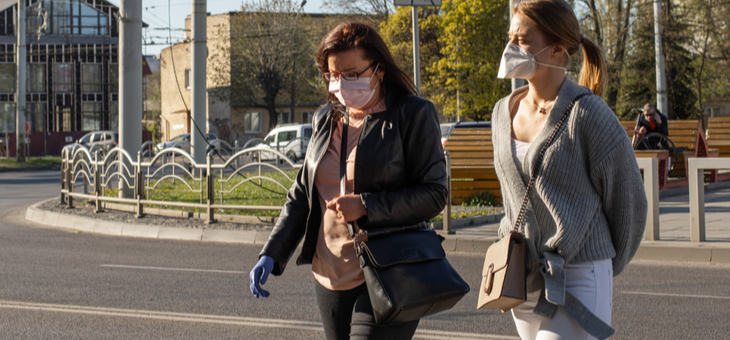As anti-mask sentiment threatens to derail efforts to stop the spread of COVID-19, scientists have debunked one of the major arguments used by anti-maskers.
There has been a suggestion that wearing a mask provides some people with a false sense of security and will see people fall back into old hygiene habits.
The latest evidence from the University of Cambridge has suggested that this will not be the case.
Researchers found that wearing face coverings to protect against COVID-19 does not lead to a false sense of security and is unlikely to increase the risk of infection through wearers foregoing other behaviours such as good hand hygiene.
Wearing masks is now mandatory in metropolitan Melbourne and the Mitchell Shire and is becoming increasingly recommended across Australia as a way of reducing transmission of COVID-19.
Worn correctly, face coverings can reduce transmission of the virus as part of a set of protective measures, including maintaining physical distance from others and good hand hygiene.
While it is not clear how much of an effect face coverings have, scientists have urged policymakers to encourage the wearing of face coverings because the risks are minimal while the potential impact is important in the context of the COVID-19 pandemic.
However, early in the pandemic, the World Health Organization (WHO) warned that wearing face coverings could “create a false sense of security that can lead to neglecting other essential measures such as hand hygiene practices”. This type of behaviour is known as ‘risk compensation’.
A team led by Dame Theresa Marteau, a professor at the University of Cambridge, examined the evidence for risk compensation to see whether concerns might be justified in the context of face coverings.
The idea behind risk compensation is that people have a target level of risk they are comfortable with and they adjust their behaviour to maintain that level risk.
At an individual level, risk compensation is commonplace: for example, people run for longer to offset an eagerly anticipated indulgent meal and a cyclist may wear a helmet to cycle at speed.
At a population level, evidence for risk compensation is less clear.
A common example is the mandated wearing of bike helmets purportedly leading to an increase in the number of bike injuries and fatalities.
Another often-cited example is the introduction of HIV pre-exposure prophylaxis (PrEP) and HPV vaccination purportedly leading to an increase in unprotected sex.
Prof. Marteau and colleagues say the results of the most recent systematic reviews – a technique that involves examining all available evidence on a topic – do not justify the concerns of risk compensation for either of these examples.
In fact, for HPV vaccination, the opposite effect was found: those who were vaccinated were less likely to engage in unprotected sexual behaviour as measured by rates of sexually transmitted infection.
At least 22 systematic reviews have assessed the effect of wearing a mask on transmission of respiratory virus infections. These include six experimental studies, involving more than 2000 households in total – conducted in community settings that also measured hand hygiene.
While none of the studies was designed to assess risk compensation or looked at social distancing, their results suggest that wearing masks does not reduce the frequency of hand washing or hand sanitising. In fact, in two studies, self-reported rates of hand washing were higher in the groups allocated to wearing masks.
The team also found three observational studies that showed people tended to move away from those wearing a mask, suggesting that face coverings do not adversely affect physical distancing at least by those surrounding the wearer.
“The concept of risk compensation, rather than risk compensation itself, seems the greater threat to public health through delaying potentially effective interventions that can help prevent the spread of disease,” said Prof. Marteau.
How do you feel about wearing a mask or face covering? Are you surprised at the people who are refusing to wear a mask in Melbourne?
If you enjoy our content, don’t keep it to yourself. Share our free eNews with your friends and encourage them to sign up.
Related articles:
https://www.yourlifechoices.com.au/health/covid19/pandemics-and-real-change
https://www.yourlifechoices.com.au/health/covid19/study-shows-15m-not-enough-to-save-you
https://www.yourlifechoices.com.au/health/covid19/why-we-should-test-65-million-a-day

